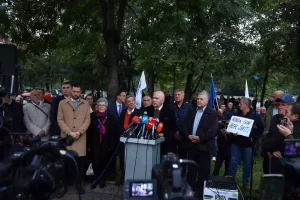Suggestion letter before the Hearings: U.S. Engagement in the Balkans

U.S. HOUSE OF REPRESENTATIVES
COMMITTEE ON FOREIGN AFFAIRS
Subcommittee: Europe, Energy, the Environment and Cyber
Suggestions before the Hearings: U.S. Engagement in the Balkans, October 28, 2021
Dear Sir/Madam,
We are a multiethnic civil society organization known as Association of Independent Intellectuals – Circle 99 from Sarajevo (74 active members out of the total of 146) that every Sunday for 28 years continuously has discussed key matters about the state and society of Bosnia and Herzegovina (www.krug99.ba).
We would like to express our gratitude to the current U.S. Administration for its support to Bosnia and Herzegovina over many years since the warfare in the Balkans in the 1990s.
However, we are very concerned about statements of some State Department envoys.
During the visits to Sarajevo options are presented for election legislation reform that are not at all feasible and, if implemented, would in fact strengthen the role of ethno-nationalist political forces in Bosnia, as well as the further division and undermining of the state. These are the same forces that, with collaboration of policies from the two neighboring countries, threatened to tear the country asunder in the 1990s and that now again have strengthened their influence. This would endanger the security not only of Bosnia but of Southeastern Europe and the broader Euro-Atlantic community. Advocating compromise to the detriment of democratic standards according to the Russian/Soviet constituent model (one country, two entities, three peoples) definitely leads only to a nonfunctional government, discrimination of citizens, destruction of the multiethnic society and reinforcement of the separatism of Republika Srpska leader Milorad Dodik and others.
Specifically, the American envoys in the country appear to make compromises with leaders of ethno-nationalist movements and their political parties as if these are the sole representatives of Bosnian people, as if these are the parties with whom permanent democratic solutions are to be found rather than with a broader spectrum of the citizens of Bosnia. In doing so, they appear to be continuing part of the legacy of the Dayton Accords. The Dayton Accords were excellent in that they ended the warfare in Bosnia and Herzegovina. But the Dayton Accords also set up a post-conflict governing structure that is dysfunctional, expensive and completely in disharmony with the best practices of the Euro-Atlantic democratic model, thus forestalling Bosnia on its path to the EU and NATO.
In effect, the creators of the Dayton Peace Accords had decided to negotiate with the political arms of militias that misrepresented themselves as the sole legitimate representatives of their peoples: Serbs and Croats. The negotiators relegated the status of the all-Bosnian republic authorities to being representatives of the Muslims. Most of the population was thus disenfranchised: Jews, Roma, others, non-adherents to those three nationalities, people of mixed origin and people who simply politically identify as citizens of Bosnia, which is the inherent right of every citizen of the world.
We express our support for a Bosnia and Herzegovina based on a simplified governing structure in harmony with models of genuine democracy in all other parts of the Euro-Atlantic community and in accordance with standards of human rights and fundamental freedoms, as in fact enumerated in Bosnia’s current Constitution.
We do not understand your envoys’ obsession with ethnic identification as a basis for formulating governing structures. This is “old think,” if not in fact “wrong think.” We fear it will lead to unworkable and negative conclusions and policies. American negotiators took a momentary aberration of warfare in the 1990s and cemented it into a permanent solution for the country in the post-war period. Your current envoys are perpetuating this rigidity to the detriment of Bosnia’s sustainability and to the endangerment of the security of the entire region and wider community. We are convinced that maintaining a kind of apartheid against development of the political structure of BiH, against citizens, civic and secular identity of the state and society, is not a genuine expression of the values of liberal democracy, of human and civil rights and freedoms, nor of the interests of the Western democratic nations.
With respect,
Adil Kulenović, President of the Association
P.S.: We also sent a letter to H.E. Mr. Anthony Blinken
U.S. Secretary of State






